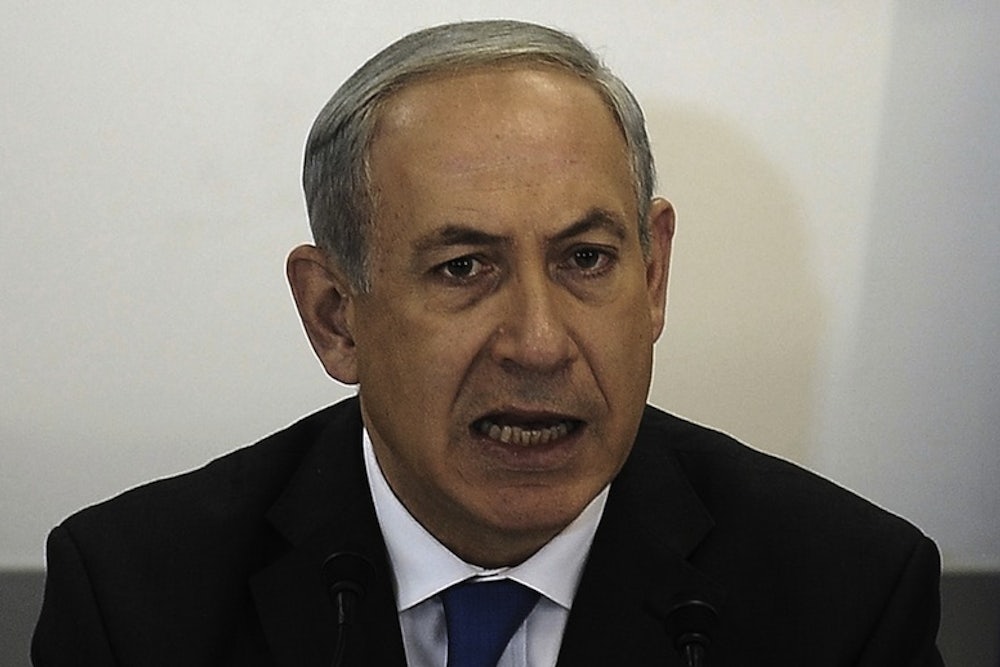You should feel sympathy for Israeli Prime Minister Benjamin Netanyahu. He is not crazy to perceive an Iran with an advancing nuclear weapons program as a potential existential threat to his country. (That Iran has a nuclear energy program is not disputed; that this program has a military component is. Two years ago, the U.N.’s International Atomic Energy Agency found “credible” circumstantial evidence that Iran is seeking to develop nuclear weapons.) He is not crazy to distrust a nuclear deal with Iran: The North Korea precedent is depressing; and even the new, more moderate Iranian president is still answerable to unelected, less-moderate mullahs—a dynamic confirmed by the report that this past weekend’s talks in Geneva were not consummated precisely because Iran’s negotiators could not sign onto the deal (“They have to go back home, talk to their government and come back”). And he is not crazy to be a little crazed: Israel’s ability to damage Iran’s nuclear program is both limited and pales in comparison to the United States’ (two words: bunker busters), meaning that, to quote a recent New York Times headline, “On Iran, Netanyahu Can Only Fume.” That’s gotta be tough. I mean it.
Speaking in Jerusalem Sunday to the Jewish Federations of North America’s General Assembly, which holds its annual meeting in Israel every five years, Netanyahu made the case, as he has before, that “a bad deal is worse than no deal,” and that this is a “bad deal.” It’s a reasonable argument, and he would be ill-serving the people who recently re-elected him if he didn’t make it.
But then he took it a step further, telling the crowd that they must be his allies in convincing the United States to nix any bad deal (which, basically, is any conceivable deal):
There is a vibrant, united Jewish world, and that is exemplified first by the tremendous bond between Israel and the Jewish communities of the United States and Canada. You are our partners. You are our brothers and sisters, and we are one big Jewish family. And like all families, we have to face challenges together. That’s what families do.
There is something extremely problematic about this. Israel is a Jewish state, but it is not the state of all the Jews. Netanyahu has a flair for playing to American audiences—“that’s the plan coming to a theater near you,” he later told the crowd. But for him to ask American (and Canadian) Jews to stand up for Israel’s interests as “partners … brothers and sisters” seems, to me, to cross a subtle but significant line. It violates the understanding that the relationship between Israeli Jews and diaspora Jews must be close but must also preserve those groups’ distinctions. They are different ways of being a Jew in the modern world, and of finding meaning in one’s Jewishness; Zionists certainly see it that way (Hillel Halkin just published a much-discussed essay confirming his belief that the fullness of Jewish life can only be experienced in Israel) and diaspora Jews ought to, too. These two paths are worthy of mutual respect, not convenient conflation.
Israelis are routinely and rightly angered when non-Israeli Jews phrase their opinions about the direction of Israeli society in ways that imply that their stake and expertise is equal (or superior) to Israelis’. What Bibi did is essentially the reverse of that, except even worse, because he is not just any Israeli Jew, he is the most powerful Israeli Jew. If Netanyahu does not understand this, he should ask himself how he would feel if American Jews, who in aggregate almost certainly have a view of Israel to the left of his (the majority oppose settlements, for example), did vote in Israel.
As if to confirm that there are some things friends shouldn’t say to friends, the Anti-Defamation League’s Abraham Foxman—as ever representing a coalition whose only obvious member is himself—lambasted Secretary of State John Kerry, who has pushed very hard in recent months for deals between the international community and Iran and between Israel and the Palestinian Authority.
“Kerry’s outrageous behavior will unite the American Jewish community,” Foxman said on Israeli radio. “It is chutzpah to lecture Israel about the risks of peace and war.”
In reality, Kerry hadn’t “lecture[d] Israel about the risks of peace and war.” He had expressed his interest, as the United States’ top diplomat, in seeing negotiations carry forward in these two crucial spheres for the sake of American interests, all while insisting that Israel, as a crucial ally, be consulted and have its interests reckoned with as well.
Presumably, however, Foxman would think Netanyahu even more chutzpahdik than Kerry, right? Bibi undoubtedly lectured Americans about the risks of peace and war.
Later in his remarks, in the “coming to a theater near you” passage, Netanyahu explained why it might be in his audience’s interest as North Americans to oppose the apparent Iranian deal on the table. That’s kosher. It wasn’t lecturing, it was an attempt at persuasion, with a legitimate appeal to self-interest. But where he explicitly asks non-Israeli Jews to speak in Israel’s voice—never mind the very particular timbre of the Israeli voice that he represents—he endangers the important but delicate relationship between these brothers and sisters.
